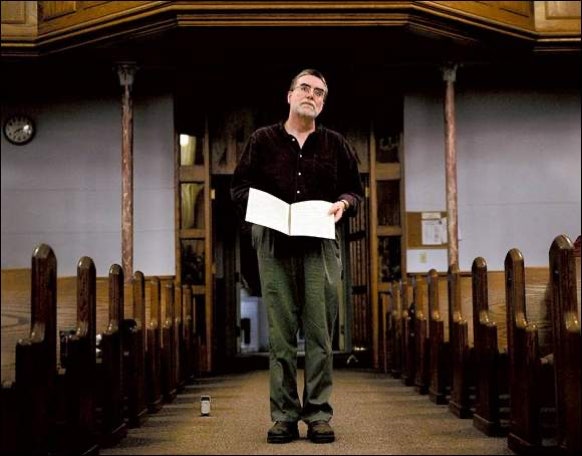
Sounds of Spring: William Fletcher's new composition for the Concord Chorale
fuses a love of poetry and a pop sensibility
by Victoria Shouldis, for the Monitor • April 28, 2008
William Fletcher clearly remembers the moment of his epiphany. It wasn't during a particularly intense listen to a bit of Beethoven, or even Mozart's surprisingly evocative Dissonance Quartet.
It was Simon and Garfunkel.
"It was a Walker Lecture Series event here at the City Auditorium, way back before Simon and Garfunkel hit it big," recalled Fletcher, a longtime classical composer whose commissioned new work "Word Winds" is featured in this weekend's "Love, Youth, and Spring" Concord Chorale program at St. John the Evangelist Church. "They just took up one part of the stage, Garfunkel standing behind Simon, who sat on a stool and played his acoustic guitar. I was in the eighth row, I think. That was my seminal moment. I took up the guitar after that."
A personal history rich in literate folk-rock as well as the more traditional classics is probably a big piece of what makes Fletcher's composed works compelling. His piece "Word Winds" is inspired by Theodore Roethke's collection Words for the Wind. In his composed work, Fletcher builds on Roethke's essential themes - the imperfect but ecstatic natural world, innocence and love.
Fletcher, who was born in Concord, teaches music theory and composition at St. Paul's School and serves as the school's choirmaster. He says he found outlets for his creative mind at a young age. Drawing was his first passion, and he returned to that first love in his 30s, when he took up portrait painting. As a child, Fletcher also found creativity through music, initially taking up drumming. "I was in about the fourth grade and my parents were incredibly supportive - they never told me to shut up!" said Fletcher of his early drumming days. "The neighbors complained, but never my parents."
As Fletcher came of age in the music-heavy '60s, he went the way of many '60s teenagers: rock and roll bands. However, unlike many of his garage band contemporaries, Fletcher also got involved with the choir in high school, and began developing his knowledge of the classics to go along with the dulcet tones of the Rolling Stones, the Beatles and, of course, the suddenly popular Simon and Garfunkel.
In college, he studied music and eventually ventured into composing. Even as he developed that talent, Fletcher kept one foot firmly in the literary world. Many of his composed works take a cue from poetry. Earlier works have incorporated the work of e.e. cummings, Sara Teasdale, and, of course, Theodore Roethke.
"I read a lot of poetry, and when I find something I particularly connect with, and that seems to have a certain music to it, I put a Post-it on the page," Fletcher explained. "Later, if I'm asked to write something specific, I can go back and find it again."
Fletcher finds that he responds most to poems that evoke feeling in him; in turn, he takes those emotions and translates them into musical notes, capturing and conveying the mood of, say, e.e. cummings's "in the rain" ("in the rain / darkness, the sunset / being sheathed I sit and / think of you). "If it's done right, the piece should tell the story of the poem without the words being needed," Fletcher said. "The composition comes from the shape of the poem, the mood it brings forth."
Fletcher, who also designs websites and does graphic design in his spare time, doesn't do a lot of composing without a specific purpose. He prefers writing on assignment, with an identified theme and length guidelines. He has composed commissioned works for the Christa McAuliffe Planetarium and previously for the Chorale; he was the director of the Chorale for 10 years in the 1980s. He has also written special works for Peggo Hodes as well as Peggo and Paul.
When Fletcher was asked to compose a piece for the Chorale's spring show, he talked to director Ryan Turner, who told him about the "Love, Youth, Spring" theme. It was a perfect fit. "I immediately thought, 'This is just what I would write about anyway!' " he said. For his work, Fletcher tapped Theodore Roethke for inspiration.
"I turn to Roethke because I have such an emotional response to him. He is joyful, and that makes it a pleasure to write music," Fletcher said.
Now that "Wind Words" has been written, Fletcher gets to experience the work not only as he imagined it, but also in the way the chorale and orchestra members interpret it. "To see and experience someone else's take on what I gave them - it's interesting. And whatever they do is right; there's no, 'That's not how I meant it.' "
Fletcher's perspective may be informed by a life of teaching; he finds affirmation and renewed focus as he works with would-be composers of the next generation at St. Paul's. "There's the old expression, 'If you want to really learn something, teach it,' and that's true. Some of composition is almost instinctual, but when you're working with kids, you have to communicate the actual process; you can't rely on the instinctual any more," Fletcher said. "Teaching others how to put it all together, the actual problem solving, the flow of composition - it's really helpful to me."
In the end, Fletcher thinks it might just be his pop music roots - and that early encounter with Simon and Garfunkel - that make his work accessible and engaging. "My own work, I think, is informed by that early rock and roll energy," said Fletcher. "The pulse, the drive - I carried that with me."

